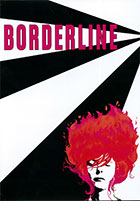
Borderline 2016
Distributed by Collective Eye Films, 2305 SE Yamhill Street, Suite 101, Portland OR 97214; 503-232-5345
Produced by Rebbie Ratner and Suzanne Mitchell
Directed by Rebbie Ratner
DVD, color, 88 min.
College - General Adult
Health Sciences, Borderline Personality Disorder, Psychology, Social Work
Date Entered: 03/09/2018
Reviewed by Bryan J. Sajecki, University at BuffaloBorderline is a narrative about Regina, a woman in a continual battle with borderline personality disorder (BPD). Directed by her close friend and filmmaker, Rebbie Ratner, the story of Regina’s struggles in everyday life are on display. Amidst this showcase, the viewer begins to see through the blurred lines of what is thought of as traditional, “normal” behavior and, in contrast, how Regina sees things.
A typical day sees the unemployed, down and out Regina go from witty and charming to completely toxic, judging everyone around her and then feeling remorse for it later on. Throughout the film, Regina is rarely on time and can never stay focused, almost living day-to-day in a whirlwind, waiting for the tide to simply just push her along to her next mess. It almost begs the question--is she living a life of self-sabotage? Her struggles with her diagnosis are very apparent, even though it has been decades since she was originally diagnosed. When it is brought up again, even by psychologists, it crushes her more and more, leaving Regina to fall back on a reliance of pills and alcohol. She also seems to have an affinity for the “f” word and detests the notion of ever being called crazy.
Ratner tells more than just Regina’s story through Borderline; she organizes an effective presentation of the diagnosis itself. The director includes a multitude of interviews from those who also suffer from BPD, tackling these individuals’ poignant thoughts of suicide, drug abuse, and their self-perspective of how and why they feel the way they do. In addition, Ratner brings in some of the leading clinical physicians in the field; Dr. John Gunderson of the Harvard McLean Hospital and Dr. Marsha Linehan, Director of the Behavioral Research and Therapy Clinics at Washington University. The latter is also a sufferer of BPD herself, which lends an interesting viewpoint to the film. These stylistic interviews are interwoven with Regina’s personal tale of woe and recovery.
Borderline is a challenging film to watch. One is not sure how to take Regina, as her fiery personality can be off putting, leaving it hard to “root for her” in a sense. However, the challenge therein lies when one begins to understand that this is borderline personality disorder. BPD is all consuming and it is difficult to deal with, even for the typical passerby who is just watching through a screen. Ratner’s choice of framing and point-of-view film style assist in making the viewer feel as if they are conversing with Regina. In addition, the mix of extreme close ups in personal interviews, scenes in both color and black and white, and digital media chapter transitions speak to the unique character of the film.
This film will be a strong addition to any academic library, especially one with a strong health science, mental health, or social work background. Regina’s multiple challenges with BPD and her perspectives on life are sure to invoke conversations in a classroom. Viewers should take into account the instances of strong language, intensely honest personal interviews, and references to self-harm and suicide.